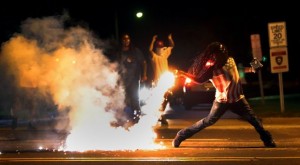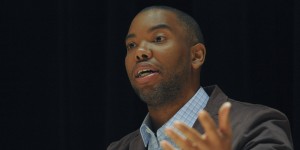Many Americans currently sit on pins and needles waiting for the grand jury decision on the fate of Officer Darren Wilson and, by extension, the fate of the passions that have animated events on the ground in Ferguson, Missouri for months. However, the story of Ferguson and the death of Michael Brown didn’t happen in a vacuum. What is important to consider is how we got to this moment intellectually—something that exists in a much larger intellectual context. I’ll sketch that out today and in coming weeks.
The “Age of Obama” has proven to be an interesting one when it comes to race. I’ve joked on Twitter before that once the dust settles from this era, historians will have a field day with the variety of incidents that have occurred based around the issue of race. These would include anything from then-Senator Obama’s run for president, to the Henry Louis Gates incident of 2009, to the firing of Shirley Sherrod, to Trayvon Martin, to the events in Ferguson. A thread running through all of these incidents is the response of President Obama to moments in recent American history that suggested that the questions some Americans assumed we answered on race long ago awaited new responses. But beyond that, the era has been a perplexing one for African American intellectuals, many of whom are divided over the issue of supporting the first African American president.
Critiques of President Obama from the African American Left have been aggressive, yet there’s also no mistaking that the counter-critiques by others on the Black Left have been equally bellicose. The most notable of this is the intellectual standoff between Cornel West and Tavis Smiley among others on one hand, and a variety of Obama supporters on the other (Melissa Harris-Perry, Michael Eric Dyson, etc.). There’s a certain irony to having the first African American president yet, at the same time, African American intellectuals having some of their fiercest arguments yet over the future of the African American community. That is not meant as hyperbole, because African American intellectual history (just like American intellectual history) is filled with moments of sharp debate and critique.
The writings of Ta-Nehisi Coates are also helpful here. I don’t want to go on a limb and declare him the best public intellectual of our age (that certainly causes much more trouble than it’s worth). While his piece on Reparations became the rage of the summer, I think his earlier essay, “Fear of a Black President”, is his most important statement on the Obama Presidency and the African American experience. There is a racial realism (not  pessimism) that pervades the essay, both a weariness in dealing with the subject of race, and a wariness in how Americans deal with the “debate over race” in the present. Throughout the piece, Coates grounds his arguments in a long, historical backdrop, reminding us of President Obama’s own reluctance to deal with the subject of race—while being at the center of so many racial controversies.
pessimism) that pervades the essay, both a weariness in dealing with the subject of race, and a wariness in how Americans deal with the “debate over race” in the present. Throughout the piece, Coates grounds his arguments in a long, historical backdrop, reminding us of President Obama’s own reluctance to deal with the subject of race—while being at the center of so many racial controversies.
I’ve been thinking a bit about some of the recent books on African American intellectual history that both point to the past and consider current day concerns as well. The one that, I believe, best captures this moment is Houston Baker’s Betrayal (2008). In it, Baker argues that “betrayal has often marked the works of hand of post-Civil Rights era black public intellectuals” (emphasis his) and that in general, black public intellectuals have lost their way since the assassination of Martin Luther King, Jr. (xii) At times the book can read as a harsh indictment of black intellectuals in the last thirty years—and that’s precisely Baker’s point. He was exhausted with the intellectual emptiness in his eyes, of the writings of such figures as West and Dyson. On West he wrote, “His work is full of earnestness, ethical polemic, flimsy evidence, and a faux sense of urgency.” (83)
Still, while Betrayal is a fascinating read, and necessary to understand not just the African American but the American intellectual moment on the eve of the Obama Age, it doesn’t quite get a question that’s been central to my writing here at the US Intellectual History blog: how does one write an African American intellectual history from 1968 (the death of King) until 2014 (the midpoint of Obama’s second term, and the Ferguson crisis)? I don’t know the answer to that question—but I’m going to take a shot. Because, in the final analysis, understanding Ferguson means understanding much, much more than the incident between Darren Wilson and Michael Brown. The response to Ferguson, both on the ground and nationally, needs a deeper historical context. That’s something I’m going to try to do in coming weeks.

7 Thoughts on this Post
S-USIH Comment Policy
We ask that those who participate in the discussions generated in the Comments section do so with the same decorum as they would in any other academic setting or context. Since the USIH bloggers write under our real names, we would prefer that our commenters also identify themselves by their real name. As our primary goal is to stimulate and engage in fruitful and productive discussion, ad hominem attacks (personal or professional), unnecessary insults, and/or mean-spiritedness have no place in the USIH Blog’s Comments section. Therefore, we reserve the right to remove any comments that contain any of the above and/or are not intended to further the discussion of the topic of the post. We welcome suggestions for corrections to any of our posts. As the official blog of the Society of US Intellectual History, we hope to foster a diverse community of scholars and readers who engage with one another in discussions of US intellectual history, broadly understood.
As usual, great post Robert.
I wonder how the intellectual history about which you speak looks if we include an international and/or global perspective? For example, how would we analyze Ferguson in terms of black internationalism?
Your post got me thinking about the work of Gerald Horne. One of his recent books, a biography of the communist lawyer William Patterson (1891-1980), presents some of the international activist work that made Scottsboro a global issue. As person on the Black Left, many times Horne has pointed out that it has been during the Obama era that some parts of Africa have experienced tremendous destabilization, the genesis of which he links to the 2010 bombing of Libya and subsequent unrest in places such as Mali. This would also include the growth of AFRICOM over the last 6 or 7 years, and what the geopolitical conflict between the US and China has looked like across the continent (and what this will look like in the future), in relation to President Obama’s pivot to Asia.
Many of these questions history will no doubt have to answer. But I did want to pose the international question, as it is a vital part of the rich conversation you have started.
Thanks for the, as always, thought provoking question. I’ve been thinking about the international angle a lot with Ferguson–people in Palestine have expressed solidarity with the people of Ferguson for example. But I think it’s deeper than that. Think back to the last few years–Horne’s point is a great one (and he’s one of my favorite scholars, so prolific!) and to go further, there’s been unrest in places as disparate as Chile and the Arab World.
I’m not sure what, as of yet, the central question of our age is, or even if there *is* such a question. But folks are certainly asking many questions of the authorities, governments, etc. However, another way to put this in context is this piece from TNR: http://www.newrepublic.com/article/119078/ferguson-civil-rights-cold-war-russia-protests
I’d hasten to add, as the article points out, that questions of America’s image abroad have shifted a little since the end of the Cold War–but concerns about how America looks abroad still matter.
Finally, I’ve been thinking about the Pan-African question–does it still exist as a serious ideology beyond a few radical intellectuals? Ferguson keeps bringing me back to that question too.
Thanks for the link, Robert. The image of the US abroad is key here, I think, and it is a complex and broad landscape. On a related note, in one interview Horne contrasted George W. Bush’s support for AIDS relief in Africa, as well as a positive record on supporting (Southern) Sudanese independence with President Obama’s sending of US troops onto the continent. Two different records that are striking.
Your inclusion of a Pan-African perspective is also useful here. It gives us much to consider.
My impression is that it is more than an intellectual construct, and broader than a mere academic interest. I have an essay coming out on WEBD’s legacy as a Pan-African intellectual in which I engage Reiland Rabaka’s recent writing on how Du Bois’s Pan-Africanism in Appeal to the World might inform contemporary discourse on reparations.
Emotion has replaced reason in Ferguson. Race hustlers have exploited Ferguson for its own agenda and profit.
See “I’m Black: Truth Does Not Matter” at http://wp.me/p4scHf-5t.
Phillip Luke Sinitiere:
On a related note, in one interview Horne contrasted George W. Bush’s support for AIDS relief in Africa, as well as a positive record on supporting (Southern) Sudanese independence with President Obama’s sending of US troops onto the continent. Two different records that are striking.
Oh, come on. Obama has basically continued the GWBush AIDS and other public health programs in Africa, so there is no significant contrast there. Ditto on support for South Sudan’s independence, which occurred in 2011, as I recall, and was supported by the Obama adminstration. As for Obama’s sending of US troops onto the continent, well, he sent a small number to help locate Kony, which hardly seems objectionable. Sent a small force to Mali, I believe, but that was mainly a French operation. The Pentagon’s Africa Command predates Obama. In short, the idea that Bush’s and Obama’s approaches to Africa are strikingly different seems bizarre.
p.s. The U.S. military presence in Africa may have increased under Obama, e.g. the opening of a drone base in Niger, to cite one thing that was in the papers not too long ago. But I don’t think the foreign-policy records of the two administrations in Africa are dramatically different.
Fair enough, Louis; your clarification is helpful. Perhaps I overstated the differences. And to be fair, history must record a fuller analysis. However, I think the point Horne wished to make was to present and critique the Africa policy of the US’s first black president, from a decidedly Left point of view.